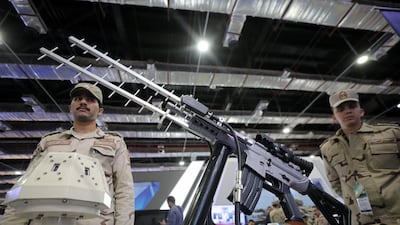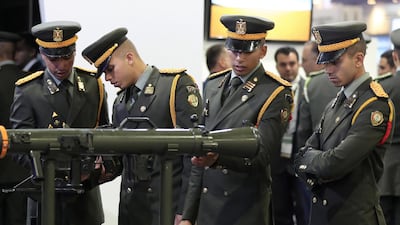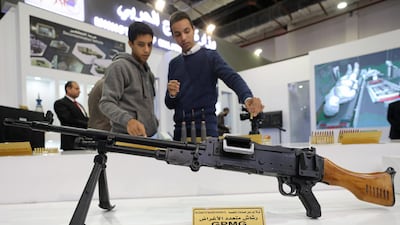When Egypt’s president and former military chief Abdel Fattah El Sisi inaugurated the country’s first defence expo last week, he was cementing a strategy of diversifying the country’s weapons suppliers while boosting its own military production.
Through hosting its own defence exhibition – the first of its kind in an African nation – Egypt is banking that an open market for defence contracts can bypass western political pressure, though a diverse military arsenal comes with costs of its own.
Some 41 countries and nearly 400 companies took part, according to Clarion Defence and Security, the British company which organised the three-day event in co-operation with the Egyptian Armed Forces. Among them were 17 UAE-based companies, more than 40 American firms, 37 French companies, 28 Chinese and 13 from Russia.
It was also the first such event open to the public in Egypt, where issues pertaining to defence are often shrouded in secrecy. To the refrains of marching bands, students, civilians and journalists mingled with police cadets and military officers, often posing for selfies in front of military hardware.

Items on display at the vast Egypt International Exhibition Centre on the outskirts of Cairo ranged from a gold-plated Pakistani submachinegun to an Egyptian-made Temsah – or Crocodile – armoured vehicle.
The expo was a manifestation of Egypt’s recent strategy of diversifying its defence partners away from a reliance on the United States and increasing its domestic production.
Since the 2014 election of former commander-in-chief of the armed forces Field Marshal El Sisi, Egypt has increased arms imports by 215 per cent, making it the third-largest destination for weapons in the world, according to the Stockholm International Peace Research Institute. The Egyptian military industrial complex continues to expand, with dozens of military-owned companies involved in everything from major construction projects to agriculture and food production. Egypt is now looking to expand its military-industrial base beyond domestic requirements to export globally.
While the economic size of the Egyptian military remains a closely guarded secret, private analysis firm Strategic Defence Intelligence estimates Egypt’s yearly military spending will reach $5.6 billion by 2022. Estimates vary wildly for the role the military plays in the country’s economy, with some suggesting it accounts for up to 50 per cent of output. President El Sisi however has said the military contributes no more than 2 per cent.
Egypt's defence strategy aims to bolster regional influence, boost its prestige and lessen its dependence on the US, an Egyptian military source told The National.
“The idea is to diversify armaments either from Russia, the US, China, or France, and not to rely on one armament source,” said the officer, who spoke on condition of anonymity to discuss a sensitive topic. “This diversity puts Egypt in a powerful position. If a country threatens to stop a deal or to dictate what you should and should not do with the weapon, you can tell them that you will go next week to another country.”
The US is a top military supplier to Egypt, providing more than $1.3bn in annual military assistance to Egypt – which is required to be spent with American defence companies. The longstanding arrangement aims to maintain Egyptian co-operation with the US and sustain the 1979 Egyptian-Israeli peace treaty.
This aid has historically been used as a political lever. Following the Rabaa and Nahda Square massacres in Cairo in 2013, at which at least 800 supporters of deposed president Mohamed Morsi were killed in clashes with Egyptian security forces, the administration of then-President Barack Obama withheld deliveries of fighter jets, helicopters, tanks and missiles.
Since then however, the Trump administration has backed down in its standoff with Egypt. In July, the US State Department announced the release of $195 million in suspended aid, despite the Egyptian government refusing to address US concerns about Egypt’s crackdown on civil society and increasing military co-operation with North Korea. “Strengthened security co-operation is important to US national security,” the State Department said. “Secretary [Mike] Pompeo determined that releasing these funds is important to supporting these needs and continuing to improve our partnership with Egypt.”
Recently, the US president has shown his sensitivity to the possibility of diminished reliance on American weapons. After journalist Jamal Khashoggi was murdered by a Saudi security team in the kingdom’s Istanbul consulate in October, Donald Trump faced pressure to sanction Saudi Arabia, which relies on American munitions for its war against Houthi rebels in Yemen.
Mr Trump argued however that the US would lose jobs by cancelling defence contracts with the kingdom, while Saudi Arabia would look elsewhere. “If we foolishly cancel these contracts, Russia and China would be the enormous beneficiaries – and very happy to acquire all of this newfound business,” he said on November 20.
___________
Read more:
Egypt: Prosecutors question actress Rania Youssef over revealing dress
Egypt's private sector activity contracts marginally in September as demand weakens
Egypt's non-oil private sector expands for second consecutive month in August
___________
Analysts warn there is a price associated with diversifying weapons suppliers however. Military effectiveness is enhanced by standardisation of weapons, training and spare parts. “Egypt's extremely diverse arsenal, therefore, imposes significant constraints on its military,” reads a report by US intelligence company Stratfor. “Its air defence forces, for instance, operate surface-to-air missile batteries that originate from the United States, Russia, France and now Germany. All the batteries are widely different platforms, making it exceedingly difficult to train forces in the same service across the various equipment.”
France meanwhile has shown an interest in increasing weapons sales to the north African nation, with French Defence Minister Florence Parly attending the expo opening ceremony alongside Mr El Sisi.
In July, Ms Parly said France was looking to decrease reliance on US approval for French arms exports, after Washington withheld clearance for an American component on the French Scalp cruise missile, which blocked the sale of additional Rafale fighter jets to Egypt.
An Egyptian military spokesman announced a memorandum of understanding with French naval defence company Naval Group to provide maintenance to French vessels operated by the Egyptian navy, while French Dassault Aviation has been contracted to provide technical support and spare parts for Rafale jet fighters recently purchased by Egypt.

Italian firms at the defence expo appeared unconcerned by ongoing diplomatic tensions between Cairo and Rome over the unresolved murder of Italian student Giulio Regeni, who Italian authorities believe was tortured and killed by Egyptian security officials in 2016.
Despite angry voices back home, Italian firearms manufacturer Beretta presented its wares, while Italian Fincantieri Group exhibited mock-ups of its FREMM Bergamini frigate and corvette ships. During the expo, Italy’s Leonardo company signed a deal with the Egyptian air defence to supply advanced radars.
A UAE pavilion at the expo hosted officials from the Tawazun Economic Council and the Emirates Defence Companies Council (EDCC). The UAE pavilion represented “an opportunity to promote made in UAE defence and security productions”, said Sultan Al Samahi, the acting director general of the EDCC.
Egypt plans to make the expo a biannual event and hopes to grow it into the largest in the Middle East.








